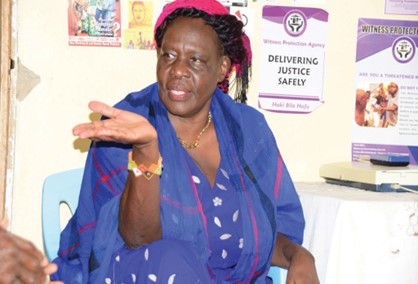
Luo Council of Elders Restores Dignity to Widows
Disclaimer: Names and identifying features have been changed to protect the identity of those involved.
Barely had Rose buried her husband before she and her four children were rendered homeless and destitute. Her husbands’ relatives, so welcoming to her during her husband’s lifetime, now denied the legality of their marriage and blamed her for his death. In 2019, Rose and her children were violently evicted from their home and disinherited of her land and property that her husband had left behind. From this point, life quickly unraveled – Rose was left to rent a single room at the local shopping centre and her children dropped out of school and were forced to beg on the streets to boost the family’s income.
Her neighbours were concerned but felt unable to intervene. Instead, they alerted the Luo Council of Elders for assistance. Gathering to discuss and then address Rose’s situation, the elders arranged a mediation between Rose and her in-laws, resulting in an agreement to let the widow and her children reclaim their land, house and some of the property – ultimately halting and reversing the damaging spiral set off by her husband’s death.
Rose’s story is just one of many Luo Council of Elders’ interventions that have addressed the plight of widows and other vulnerable women and families. The Council is a focal point for Alternative Dispute Resolution, which according to Silas Olala, the Council’s Secretary General, supports over 50 widows every year. Meanwhile, the influence of Luo Council of Elders in supporting widows continues to grow, and the council continues to develop its reputation as a safe space for women in need of support.
Strategic interventions and targeted approach for change
Women Concern Centre, a local community-based organisation supported by the UK-funded REINVENT Programme, took an interest in working with the Luo Council of Elders after an analysis of cases reported to its office in 2018. It revealed that the misapplication of cultural practices among the Luo people presented a barrier to women’s fulfilment of their property rights. “We received many cases from widows where culture had been used as a justification to dispossess them of their land and property. Others reported being sexually assaulted by their relatives to force them out of their matrimonial homes,” explains Margaret Omondi, Executive Director of the Women Concern Centre. The analysis revealed that women who had been dispossessed and evicted from their homes went to live in informal settlements of Kisumu Town such as Obunga, Kaloleni, Manyatta and Nyalenda.
These findings inspired Women Concern Centre to approach the chairman of the Luo Council of Elders, seeking to address three key issues:
1) Insights on the Luo culture
2) The role of elders in mitigating violence against women under the traditional alternative dispute mechanisms
3) The establishment of a partnership between the Centre and the Council on how to address the plight of widows and other women experiencing violence in the context of cultural practice.
“Council approval was a very important step in accessing the Alternative Justice Mechanism, which widows found more accessible than the lengthy and expensive legal processes in the formal justice systems,” says Omondi.
The strategic partnership between the Women Concern Centre and the Council of Elders centred on two key objectives. First, to provide comprehensive capacity building training to the elders on human rights and legal provisions that govern land and property rights, as well as the mediation process. Second, to enhance the referral system and link women to legal actors for pro bono legal representation.
The Centre delivered capacity building training on using a gender lens in dispute resolution processes, as well as gender- transformative approaches at the organisation’s structural level. A group of 40 elders, 10 from each of Siaya, Homa Bay, Migori and Kisumu counties, were nominated by the Council’s secretariat to participate in the training. The Judiciary, FIDA Kenya and KELIN collaborated with Women Concern Centre in capacity building. “Given the position of the elders in their communities, we incorporated peacebuilding training to strengthen their ability to mitigate conflict. This has helped to enhance peace within communities because elders’ words command a lot of respect,” Omondi explains.
An ongoing success story
Between 2020 and 2022, the council has handled over 40 cases of widows being dispossessed in Siaya, Homa Bay, Migori and Kisumu counties. Of these, at least 15 cases have been successfully resolved. Victims have had land, property and dignity restored. In criminal cases, victims have been supported in accessing the formal justice system.
The partnership between the Centre and Luo Council of Elders has flourished. Since the initiative began, Women Concern Centre has worked with the Council to entrench these values, and to encourage the elders to take a leadership role in protecting women’s rights. Now, for the first time in its existence, the Council has incorporated women elders in its decision-making committees. Women who have made a remarkable contribution to the community, enjoy great respect, and are likely to add value in the resolution of cases, are invited to join the Council.
The inclusion of women elders in Council leadership brings other benefits. Professor Phoebe Nyawalo, the chairlady of the Luo Council of Elders in Siaya County, is among those women on the Council. She notes that the inclusion of women in the Council has added immense value to all its cases: “Women look at issues through a gender lens, especially when mediation is around cases relating to violations of women’s property rights. Female survivors identify and relate with women elders during the mediation processes. They confide in them on issues that they would rarely or never speak about in front of male elders.” The Council now better understands women’s issues, and how to assist them, improving the quality of dispute resolution.
The Council’s successes in gender-sensitive case handling has been recognised by the National Council of Elders, which brings together Councils of Elders from more than eight counties in Kenya. Omondi says it was a game changer to include disinherited widows who were seeking justice in the Luo Council of Elders as a critical socialising agent in the mitigation of violence against women.
The challenge continues
Even as the Council celebrates its success in advancing justice for women, they still face many challenges in the pursuit of greater achievements, says Silas Olala, the Council’s Secretary General.
Eldership is a voluntary office, and members of the Council perform work without pay. The elders, many of whom have no source of income, are expected to finance the operations of the Council. Sometimes, the elders are unable to attend to cases, especially those in remote areas where their services are needed most. Financial limitations also make it difficult for the elders to carry out effective follow-ups on the cases they refer to the formal justice system, especially those that involve fraud and corruption.
The elders also have to deal with challenges relating to culture and stereotypes. There remains misinformation about Luo customary practices, which complicates the elders’ work. For instance, the word Tero, which means ‘escort’ in Dholuo, has been corrupted and misinterpreted to mean widow inheritance. Relatives use this incorrect interpretation to stigmatise and dispossess widows who refuse to be inherited.
Olala believes such ignorance can only be addressed by continued public education: “We need a partnership with the media to help elders educate the community on cultural concepts, and laws relating to land and property rights.” The elders note that many widows avoid making reports to stake a claim on land and property for fear that such actions will make them vulnerable. They only seek the elders’ assistance in desperation. Low literacy levels of survivors compound this problem: “We are planning to provide platforms to educate widows and encourage beneficiaries of this initiative to help others access justice,” says Omondi.
Women Concern Centre reflect on continued lessons learnt from their intervention. A multi-sectoral and collaborative approach among key stakeholders with shared visions towards mitigating violence against women and girls in communities can improve and hasten justice for women. “Working with the government and non-state actors has added value to our work in enhancing justice for widows, because different players bring their unique expertise in the process,” says Omondi. She is hopeful that if the Luo Council of Elders receives the necessary support and recognition, justice for women will continue to develop as a reality for all.
